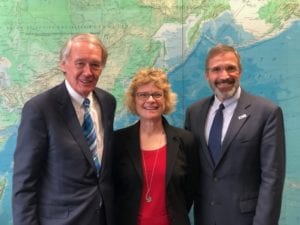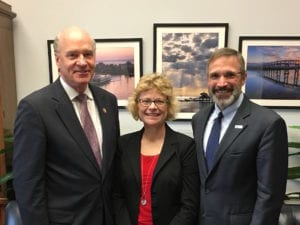Who is a member?
Our members are the local governments of Massachusetts and their elected and appointed leadership.

Sen. Ed Markey (left), MMA President and Norwell Selectman Ellen Allen (center), and MMA Executive Director Geoff Beckwith (right)
MMA President Ellen Allen and Executive Director Geoff Beckwith traveled to Washington, D.C., on Feb. 6 and 7 to lobby for municipal priorities as part of a Capitol Hill “fly-in” coordinated by the National League of Cities.
Allen and Beckwith joined the leaders of municipal associations from 18 other states, who met with members of Congress to discuss the need for major public infrastructure investments, the importance of protecting municipal authority in cable and telecommunications regulations, and other key issues.
Allen and Beckwith met with Sen. Ed Markey, Congressman Bill Keating, and staff members from the offices of Reps. Katherine Clark and Stephen Lynch. In addition, they joined officials from Tennessee to visit with Sen. Marsha Blackburn.

Congressman Bill Keating (left), MMA President and Norwell Selectman Ellen Allen (center), and MMA Executive Director Geoff Beckwith (right)
The NLC is working closely with the MMA and municipal officials in every state to advance its Rebuild With Us campaign, which advocates for comprehensive federal legislation to rebuild and reimagine America’s infrastructure in partnership with local governments. Beckwith and Allen highlighted key transportation, environmental and water-related infrastructure needs across Massachusetts.
In meetings with their state municipal league colleagues, and then with Congressional leaders, Allen and Beckwith discussed the dual challenges of declining state and federal investment in infrastructure and the increased risks associated with climate change.
“It was terrific to have MMA President Ellen Allen participate in the NLC fly-in,” Beckwith said. “She was able to bring real-world examples of how Washington can help the cities and towns of Massachusetts, speaking as the chair of the Board of Selectmen in Norwell and as a leader who has a strong grasp of municipal concerns.”
Allen discussed the thousands of culverts and small bridges in Massachusetts that are in need of repair or replacement, the 30,000 miles of local roads that cities and towns must maintain, and the $20 billion funding gap that communities are confronting to keep local water, sewer and stormwater systems functioning over the next 20 years.